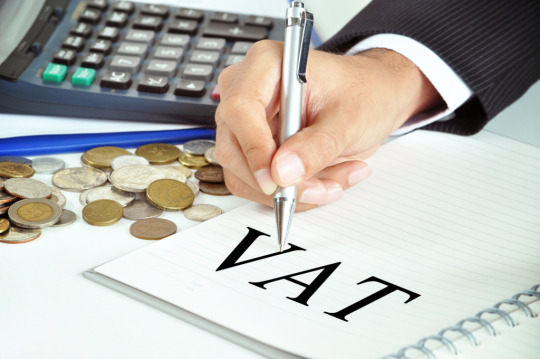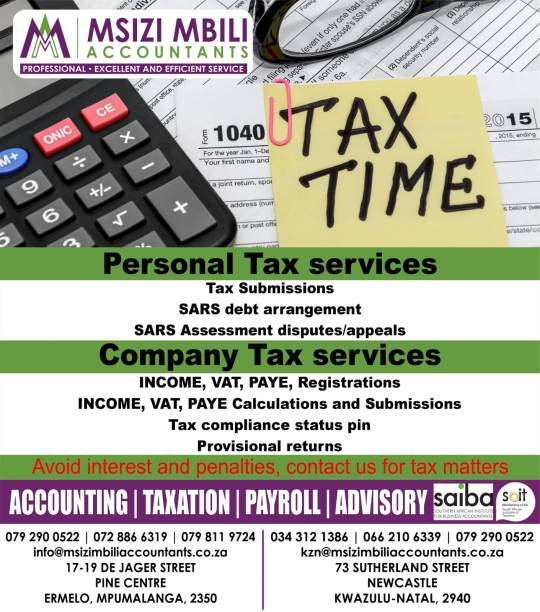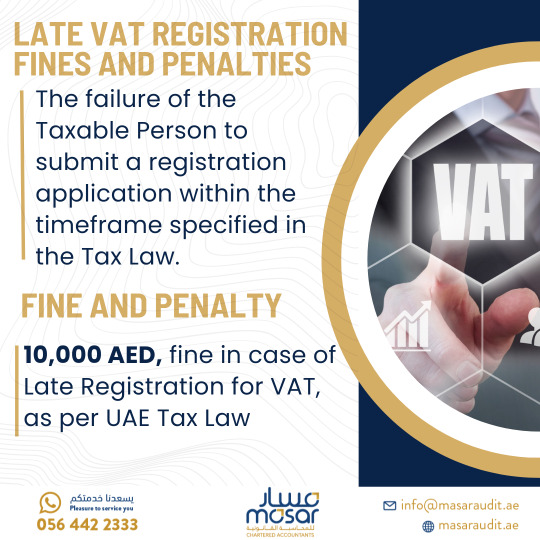#vat registration services
Text
#vat services#vat consultant in dubai#best vat services#top vat consultants#vat consultants in dubai#vat professional consultants#vat refund#vat registration#vat registration services
0 notes
Text
MPMS - VAT Registration in Dubai, UAE
Efficient VAT registration services tailored to your business needs. Milestone provides cost-effective services for VAT Registration in Dubai, UAE for your businesses.
0 notes
Text

Follow MASAR Chartered Accountants For more details.
“Late VAT Deregistration Fines and Penalties”
For Free Consultancy. We are Always Available for you.
📧 [email protected]
📞+971 56 442 2333
🌐 https://masaraudit.ae/
#vatderegistration #vatservices #vatfines #vatpenalties #FTATaxagents #taxagency #uaetax #uaecorporatetax #masarcharteredaccountants #masar
0 notes
Text

Navigating VAT in Dubai made seamless! Our expert VAT services ensure compliance, minimize liabilities, and streamline your business processes. Focus on growth while we handle the complexities. Let's elevate your financial strategy together.
Contact Us Today!
Email: [email protected]
Phone: +971 43 513 626
Get a FREE Quote : https://tinyurl.com/5388cjzv
#vat#tax#vatrefund#vatregistration#vatfiling#vatreturn#vat registration uae#vat return services#vat registration in dubai#vat return filing dubai#vat registration services#vat consultants in uae#business#bookkeeping#taxes#dubai#uae#uaevat#accountingservices#taxation#smallbusiness
0 notes
Text

What is the Process for VAT Registration in UAE?
Whether you own a small, medium, or large firm, you must register for VAT in the UAE in accordance with Emirati VAT law. The fact that your firm is registered under the UAE VAT law means that the government recognizes it. The income generated by your firm will determine whether or not you need to register for VAT in the UAE. Xcel Accounting is a renowned consultancy in the UAE that provides exceptional VAT registration services in Dubai, as well as VAT deregistration, VAT accounting, VAT return filing, and many more.
0 notes
Text
Steps And Requirements VAT Registration In UAE
Under the value-added tax (VAT) system implemented on January 1, 2018. UAE VAT registration is mandatory for businesses with annual revenue exceeding AED 375,000 ($102,000).
Registration to the FTA requires a sound basis for the registration, preparation of the necessary evidence, and documentation to proceed without delays or issues. Therefore preparation and planning are key to minimising issues, potential risks, and penalties.
Here are the steps and requirements for VAT registration in the UAE:
1. Determine your business’s eligibility for VAT registration.
To determine your business’s eligibility for VAT registration, you need to consider the following:
Taxable Income: If your business has revenue exceeding AED 375,000, you must register for VAT calculated on a rolling basis, including the preceding 11 months and the next 30 days.
Type of business: All businesses operating in the UAE must register for VAT except for a few exceptions. These exceptions include businesses that are exempt from VAT, such as the sale and supply of some financial and insurance services
Location of business: Businesses operating in the UAE, regardless of location, must register for VAT if they meet the above criteria.
2. Register your business with the Federal Tax Authority (FTA).
To register your business for VAT, you must register it with the Federal Tax Authority (FTA). To do this, below is a summary of the minimum requirements:
Possess a Trade License: To register your business for VAT, you need a Trade License.
Register with the FTA: Once you have a Trade License, you need to register your business with the FTA through their e-Services portal. You will need to provide the following information:
Business name and address
Bank details
Type of business activity
Trade License number
Details of the business owner(s)
3. Obtain a Tax Registration Number (TRN).
Once you have registered your business with the FTA, you will receive a Tax Registration Number (TRN). This number is unique to your business and will be used for all your VAT-related activities.
4. Set up a VAT accounting system.
To comply with VAT requirements, you need to comply with the provisions as a taxpayer as set out in the Executive Regulations. Ideally, you should set up a VAT accounting system that tracks your business’s VAT-related activities to help with the VAT reporting. This includes:
Recording the VAT charged on your sales and the VAT paid on your purchases
Maintaining detailed invoices for all your sales and purchases
Preparing and submitting VAT Returns to the FTA regularly
VAT returns must be filed regularly, typically quarterly, or monthly. To file a VAT Return, you need to:
Prepare a VAT Return form: The VAT return form includes details of your business’s sales and purchases for the period and the VAT charged and paid.
Submit the VAT
Payment on VAT due
#vat registered#VAT Registration in Dubai#VAT Registration Services in Dubai#vat registration uae#vat return filing
2 notes
·
View notes
Text

#Taxation Services#Personal Tax Services#Tax Submissions#Sars debt arrangement#Sars Assessment disputes/appeals#Company Tax services#INCOME#VAT#PAYE#Registrations#PAYE Calculations and Submissions#Tax compliance status pin#Provisional returns#Avoid interest and penalties#contact us for tax matters.
4 notes
·
View notes
Text
UAE VAT Registration Guide For 2023

In the United Arab Emirates (UAE), VAT is a consumption tax that is levied on most goods and services sold in the country. If your business is based in the UAE or you are planning to start a business in the UAE, you may need to register for VAT if your taxable supplies and imports exceed a certain threshold.
To register for VAT in the UAE, you will need to follow these steps:
Determine if your business is eligible to register for VAT. In the UAE, businesses with a taxable turnover above AED 375,000 per year are required to register for VAT.
Prepare the necessary documents. To register for VAT, you will need to have the following documents:
Trade license
Emirates ID or passport of the business owner(s)
VAT registration application form
Submit the VAT Registration application. You can submit your VAT registration application online through the Federal Tax Authority’s (FTA) e-Services portal or at an FTA customer happiness center.
Wait for approval. Once you have submitted your VAT registration application, the FTA will review your application and determine if you are eligible to register for VAT. If your application is approved, you will receive a VAT registration certificate.
Charge VAT on your sales. Once you have registered for VAT, you will need to start charging VAT on your sales at the applicable rate (currently 5%). You will also need to submit VAT returns to the FTA on a regular basis to report the VAT you have collected and any VAT you have paid on your purchases.
It’s important to note that VAT registration and compliance can be complex, and it is advisable to seek the guidance of a professional tax advisor to ensure that you are following UAE VAT regulations.
VAT De-Registration in UAE
In the United Arab Emirates (UAE), businesses that are registered for value-added tax (VAT) may de-register for VAT if they meet certain conditions. To de-register for VAT, a business must first inform the Federal Tax Authority (FTA) and then submit a de-registration application through the FTA’s e-services portal.
To be eligible for VAT de-registration, a business must meet the following conditions:
The business must not have any taxable supplies or imports in the past 12 months.
The business must not expect to have any taxable supplies or imports in the next 30 days.
The business must not have any outstanding tax liabilities or penalties.
If a business meets these conditions, it can apply for de-registration by completing the de-registration application form on the FTA’s e-services portal and submitting it along with any required supporting documents. The FTA will review the application and may request additional information or documentation before deciding on the de-registration.
If the de-registration is approved, the business will no longer be required to charge VAT on its supplies or pay VAT on its imports and will no longer be required to file VAT returns. However, the business may still be required to retain certain records for a period in case they are needed for audit or verification purposes.
VAT Return Filing in UAE
VAT Return filing is a process by which businesses report the amount of VAT they have charged on sales and the amount of VAT they have paid on purchases. VAT returns are typically filed on a regular basis, such as monthly or quarterly, depending on the rules of the country where the business is located.
In the United Arab Emirates (UAE), VAT is administered by the Federal Tax Authority (FTA). Businesses that are registered for VAT must file VAT returns with the FTA on a regular basis. VAT returns must be filed electronically through the FTA’s e-Services portal.
To file a VAT return in the UAE, businesses will need to:
1. Gather all the necessary documentation, including invoices, receipts, and other records of sales and purchases made during the relevant period.
2. Use this documentation to calculate the total amount of VAT that has been charged on sales and the total amount of VAT that has been paid on purchases.
3. Log in to the FTA’s e-Services portal and navigate to the VAT return filing section.
4. Enter the required information, including the total amount of VAT charged on sales and the total amount of VAT paid on purchases.
5. Submit the VAT return.
It’s important to note that businesses must file their VAT returns by the deadline set by the FTA. If a business fails to file its VAT return on time, it may be subject to penalties and fines.
#vat registration#vatinuae#VAT Registration in Dubai#VAT Registration Services in Dubai#vat registration uae
2 notes
·
View notes
Text

Auditing is an essential tool for promoting accountability and supporting business growth. It ensures financial transparency, encourages ethical practices, and provides valuable insights that can guide strategic decision-making. For businesses in South Africa, working with ANM Accountants for auditing services ensures compliance with regulations and opens the door to long-term success.
With their expertise in auditing, accounting services, and business growth strategies, ANM Accountants are the ideal partner for businesses looking to improve accountability and drive growth. Whether you're a small business or a large enterprise, ANM Accountants have the solutions to help you succeed in today's competitive market.
#accountants#business registration#accounting services#tax advisors#company registration#register for vat#vat services
0 notes
Text
VAT Registration in Dubai, UAE - Milestone
Get hassle-free VAT registration services tailored to your business needs. Milestone is a top business consultancy that provides affordable services for VAT Registration in Dubai, UAE.
0 notes
Text

Late VAT Registration Fines and Penalties in UAE
For Free Consultancy. We are Always Available for you.
📧 [email protected]
📞+971 56 442 2333
🌐 https://masaraudit.ae/
#vatregistration #vatservices #vatfines #vatpenalties #FTATaxagents #taxagency #uaetax #uaecorporatetax #masarcharteredaccountants
#vat registration services#vat return services#vat services#vat return filing dubai#vat consultants in uae
0 notes
Text
Cross-border VAT audits: Preparing for increased scrutiny
The face of VAT compliance has changed in the recent past. Globalisation and increasing complexity in the supply chain make cross-border VAT audits formal. This would mean businesses having to find their way through a web of regulations and ensuring that their VAT practices measure up to the mark. This blog shows how businesses can prepare for such heightened scrutiny involved with cross-border VAT audits.
What are cross-border VAT audits?
VAT cross-border audits aim at scrutiny of the records of value-added tax and compliance of transactions spanning across many countries. The audits are carried out by tax authorities to ensure that businesses apply the rules and regulations of VAT correctly across various jurisdictions. With the increased wave of international trade, tax authorities are increasingly putting their focus on cross-border transactions in order to avoid fraud and also ensure the correct collection of VAT.
UK VAT Registration
IOSS VAT Registration
Why are cross-border VAT audits becoming more common?
The following are some of the major drivers of the increase in cross-border VAT audits:
Globalization and Trade Expansion: The more businesses run across borders, the more complicated VAT compliance becomes. It gives authorities a keen eye to make sure VAT obligations are met in each jurisdiction.
Technological Advancements: Sophisticated data analytics and electronic invoicing systems will facilitate the tracing and analysis of transactions by tax authorities.
Need for More Revenues: Governments face budgetary pressures and therefore attach considerable importance to VAT compliance as a source of revenue generation. This has made auditing practices more proactive.
According to the European Commission, in 2022, the estimated VAT revenues lost due to fraud and non-compliance reached EUR 93 billion only for the EU; this shows its growing importance.
How can businesses prepare for Cross-Border VAT audits?
It’s not possible to sail through cross-border VAT audits without proper preparation. Some of the steps that a business must take are as follows:
Understand the VAT regulations in each jurisdiction
Countries have varying rules and regulations with respect to Value-Added Tax. It is important that businesses are aware of such value-added tax requirements in any country a business entity is involved in. This would include:
VAT Rates: Many countries apply different rates of VAT on different types of goods and services.
Exemption Rules: The rules governing VAT exemption and zero-rated supplies may be different in every jurisdiction.
Documentation Requirements: Proper documentation is essential for compliance and supporting VAT claims.
Staying up-to-date on changes to the VAT regime is very relevant. For instance, as a result of the OECD’s BEPS project, new guidance has been issued which may impact cross-border VAT practices.
Maintain accurate and comprehensive records
Proper record keeping is the most crucial factor for ensuring VAT compliance. Check that your record-keeping is full and up-to-date, including:
Invoices: Keep all invoices issued and received, ensuring that they are in line with the VAT requirements placed on you in all jurisdictions.
Contract: Document all the terms of the cross-border deals, including payment methods and value-added tax treatment.
Customs Declarations: Retain records of any information which serves as proof for the customs declaration of goods that cross the border.
The International VAT Association reported that the risk of penalties arising from an audit can be significantly reduced if a robust record-keeping system has been maintained.
Implement robust internal controls
Internal controls also aid compliance with the VAT regime and minimise errors to the best extent possible. The following controls may be considered:
Automated Systems: Make use of VAT compliance software for the automation of calculations and generating accurate reports.
Regular Audits: Conduct internal audits for reviewing the VAT process and to point out the problems, if any, before external auditors do.
Training: Undertake regular staff training in respect of the VAT regime and compliance procedures.
A study by the VAT Forum indicates that the use of automated VAT compliance tools can reduce errors and enhance efficiency.
Conduct a Self-Assessment
In case of self-assessment, you would have to relook at the VAT practices for improvement opportunities. Top such attitude and approach can assist proactively:
Identify Risks: Spot potential compliance issues before they become problems.
Procedures Updating: This will involve reviewing the VAT procedures in line with the new regulations and best practices.
Prepare for external audits: Many of the concerns raised during the self-assessment phase shall have to be worked on to make the process of external audit more streamlined.
Engage with VAT experts
VAT experts can bring on board valuable insight into ensuring compliance. VAT consultants can:
Interpretation of Complex Rules: The firm will assist you in understanding the complex rules of VAT and their application in different countries.
Assistance with Documentation: Ensure that your document meets up to the requirements of each country.
Provide Audit Support: Offer guidance and support in case of VAT audits to handle all issues related to the same.
According to Deloitte, businesses that used VAT consulting services surveyed reported, at worst, as low as 20% in audit findings and penalties.
What are the consequences of non-compliance?
Failure to comply with cross-border VAT regulations runs the risk of incurring very serious penalties, including:
Fines and penalties: Non-compliance can result in several fines and penalties, which could have financial implications for your business.
Reputation damage: Bad VAT practices can ruin your image and lose the trust of your customers and/or partners.
Enhanced Scrutiny: Non-compliance may mean that your business is subject to higher frequency and depth of the audit, thus burdening the business more.
According to the European Commission, failure to comply with VAT obligations may lead to financial losses and operational problems for companies in the VAT Gap Report.
Any business requiring cross-border VAT compliance support can avail expertise from Cross-Border VAT on audit support. You can also seek help when expanding your operations to the EU and UK.
In summary, successful preparation for cross-border VAT audits requires familiarity with the rules on value-added tax, keeping of records, internal controls, and support. Businesses with such measures in place can be sure to stay on top of the intricacies of cross-border VAT compliance, reducing thereby the potential risks related to close scrutiny.
Disclaimer:
This blog is for information purposes only and should not be relied or acted upon when making financial decisions. Always seek professional advise prior to taking any action.
0 notes
Photo

Expert VAT Registration Services for Dubai Businesses
Xcel Accounting provides professional assistance for VAT Registration Services in Dubai. Our experienced team will guide you through the necessary documentation and requirements, ensuring compliance with VAT laws and regulations. Our services are designed to simplify the process and minimize the burden on businesses, allowing them to focus on their core operations. Trust us to handle your VAT registration needs and ensure that your business stays compliant.
0 notes